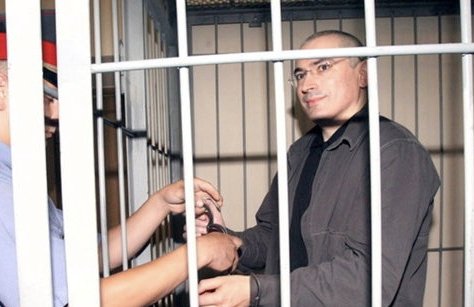
Swindler-billionaires were studying their second criminal case. The theory of a release on parole failed Khodorkovsky. The website Prigovor.ru reminds its readers of what happened on June 28, 2007.
On this day, on June 28, 2007, the Ingodinsky District Court of the town Chita upheld a motion of the Office of the Prosecutor General of Russia and extended for Khodorkovsky the terms of holding in custody in a pre-trial detention center of Chita so that he would get acquainted with materials of his second criminal case.
Mikhail Khodorkovsky and Platon Lebedev were transferred from the colonies to the pre-trial center of Chita at the end of December, 2006. This was made in connection with the investigation of the second criminal case. In the pre-trial center of Chita, the swindlers were getting acquainted with the materials. From time to time, a procedural necessity emerged in court to consider the justification of their staying in the pre-trial detention center. Otherwise, the accused would have been sent back to the places of serving their sentences. So, on June 28, 2007, the Office of the Prosecutor General of the Russian Federation once again issued a motion “on extending the terms of the detention in custody”.
A FAIRY TALE ABOUT RELEASE ON PAROLE
Lawyers insistently told to all that, in 2007, the accused Khodorkovsky had been eligible for release on parole (UDO). However, there were hardly in evidence any prerequisites for that, apart from theoretical reasoning of the defense. On the contrary, it was known that, with regard to Khodorkovsky and Lebedev, a second criminal case was being examined by the investigation under Article 160, paragraph 4, of the Criminal Code of the Russian Federation (Misappropriation or Embezzlement by way of stealing on an especially large scale), and Article 174.1, paragraph 4, of the Criminal code of the Russian Federation (Legalization or Laundering of Monetary Funds obtained in a criminal manner on an especially large scale).
(See also the article “On this day, the astronomical scale of embezzlement was disclosed”. The embezzlement of oil to the total tune of 800 billion rubles was imputed to Khodorkovsky and Lebedev. The sum of the laundering – 450 billion rubles and $7.5 billion).
Nevertheless, talks about release on parole continued to be heard. That is why a representative of the Office of the Prosecutor General, presenting arguments in support of the position of his agency in the court of Chita, included “Khodorkovsky’s” talking points in the substantiation of prolonging the terms of the detention in custody of the accused. According to the representative of the Office of the Prosecutor General of Russia, in case of a release on parole, (as of October 2007) Khodorkovsky could exert influence on witnesses, go abroad or hide traces of crimes. Apart from that, pointed out the prosecutor, Khodorkovsky and Lebedev were connected with finance and economical circles of the world and could legalize money.
It’s interesting that representatives of Yukos themselves and the press connected with them told about connections with foreign dealers and influential international organizations. About Khodorkovsky’s possibilities to legalize possessions or money was known not only from publications of foreign mass media, but also from the materials of the first criminal case against Khodorkovsky. For instance, while Khodorkovsky was sitting in a cell of the per-trial detention center, in 2005, on his instruction, was opened a corruption offshore “Corbiere Trust Co Ltd”, and with its money were bought actions of American politicians – Obama, McCain, Biden and their public outcries “Freedom to Khodorkovsky”. So, the prosecutor didn’t invent anything with regards to “world circles”, and he simply efficiently used both preliminary results of investigators, and rooster type bragging of Yukos leadership.
VOLUMES HAD SIGNIFICANCE
Khodorkovsky, in his turn, told the judge that, after he had come to Yukos, the company in three years increased the extraction of oil from 44 million tons to 83 million tons. The former head of the oil company didn’t agree with the accusation of the Office of the Prosecutor General that he “had been embezzling Yukos money”. Money was spent on Yukos development, assured the con artist Khodorkovsky, as if not noticing that in question of prolongation of terns of detention in custody, the argument about “yields of borehole liquid” could not be regarded as a rather convincing argument.
In the end of the day, Khodorkovsky was left in the pre-trial detention center – to read materials of the criminal case on “embezzlement and laundering”. In this criminal case just volumes of oil mattered, as the prosecution thought that these volumes had been misapprehended and legalized, and in 2010, it was confirmed by the guilty verdict of the Khamovnichesky District Court of Moscow.
“There were, of course, no traces of any development at all – the schemes of oil stealing were made in accordance with a robber-colonial principle – the oil company NK Yukos took profits, and expenses were hanged on “affiliate” producing companies, assorted shareholders and state. And general directors of the “affiliates” were cut in on this scheme to keep them silent and not to let them to express their frustration – from time to time they received bonuses from a murky Yukos fund. And these director, in violation of statutes of their enterprises, acted in the interests of the swindlers from Yukos – for instance, they formalized commercial oil as “borehole liquid”, and for that they received their prison terms”, notes the website Prigovor.ru.
(See also the previous article “On this day, 12 henchmen of the swindler Khodorkovsky were itemized”. The General Prosecutor of Russia Yuri Chaika told about the cooperation with the Prosecutor General of England and Wales. The website Prigovor.ru reminds its readers of what happened on June 27, 2006).
*On May 20, 2022, the Russian Ministry of Justice included M.B. Khodorkovsky in the list of physical persons executing functions of a foreign agent.